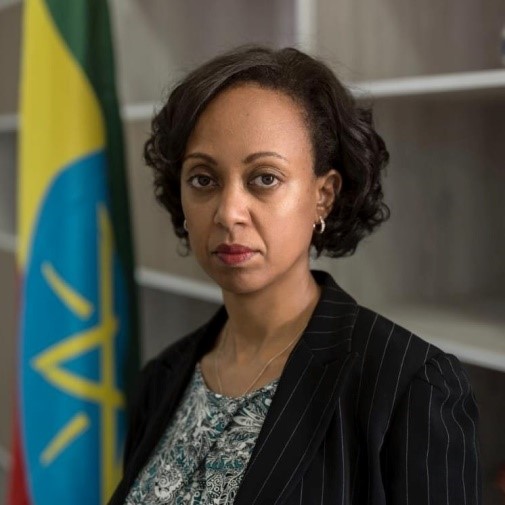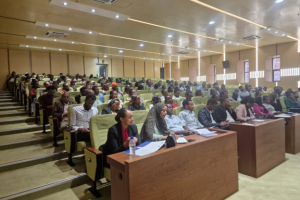
Minister Lia Tadesse is an obstetrician and gynecologist with extensive leadership experience in healthcare, academia, hospital management, and grant-funded programs. Prior to her appointment as Minister of Health of Ethiopia on 12 March 2020 – just one day before the first case of COVID-19 was confirmed in Ethiopia-Minister Lia Tadesse served as State Minister of Health from 2018 to 2020, leading Ethiopia’s national health programs under the Health Sector Transformation Strategy.
From 2015 to 2018, she served as Program Director of the Center for International Reproductive Health Training at the University of Michigan, and from 2014 to 2015; she was Project Director of the United States Agency for International Development’s (USAID) Maternal and Child Survival Program in Ethiopia.
The following is the interview she had with the EJS center about her role as Minister of Health at such a uniquely challenging moment and how her commitment to improving women’s health has helped shape her own career and leadership journey.
Can you tell us a bit about your career journey, and what motivated you to focus particularly on improving women’s health?
Since childhood, I always wanted to be a physician, but it was during my time in medical school that I became really drawn to women’s health, especially in my fourth clinical year when I started my rotations in obstetrics and gynecology.
I was trained at one of the universities in the southwestern part of Ethiopia, Jimma University, which served a huge catchment population. We saw many different patients—women who had suffered a great deal for a long time with delayed labor, obstructed labor, and other challenges.
This experience showed me firsthand how medical interventions really save women’s lives, and it was extremely gratifying to be able to work in this area. Of course, there were also very sad moments when we were not able to save women, especially those coming from rural areas who received medical attention too late.
I continued my specialty in OB-GYN, but I think during that time I developed an interest in improving health systems and healthcare delivery. I think that was what drew me to take on leadership and administrative roles after I graduated as an OB-GYN. I spent a long time as hospital CEO and Vice Provost of St. Paul’s Hospital Millennium Medical College (SPHMMC), a teaching institution in Addis Ababa, and I progressively took on more administrative roles.
I’ve now held positions at several non-governmental organizations, but my passion remains in improving healthcare systems, with a focus on reproductive, maternal, and child health. So, before stepping into my current role at the Ministry of Health, I served as State Minister of Health for some time.
How has COVID-19 impacted women’s health in Ethiopia and across the continent?
The COVID-19 pandemic has shown us many things, including the impact it has had on women. When you look at the data about the impact of COVID-19, and its death rates, the disease appears to be less severe for women. However, the indirect impact of COVID-19 has been really severe for women in terms of the economic, psychosocial, and other pandemic-related health issues.
As a country, the COVID-19 response measures that we have taken overall have not included enforcing a strict lockdown. We have tried to balance our response by taking the economic context of our country into consideration. But even with this in mind, we’ve seen the rate of unemployment increase during the pandemic, with higher rates of unemployment for women than for men. We’ve seen that when interventions like school closures happen, women are more likely to forgo their jobs to stay home and care for children and the sick.
In Ethiopia, as in other countries, women have faced additional challenges. We know that there has been an increase in gender-based violence. There’s also the challenge of accessibility to and disruption of public services due to COVID-19, including impaired access to services that are specific to women, such as antenatal care and delivery facilities. Collectively, the indirect impact of COVID-19 on women has been huge.
The first case in Ethiopia was confirmed the day after your appointment so what motivated your decision to step up, in spite of the challenges that lay ahead?
Yes, it was a very challenging moment. I had been serving as a State Minister before entering my current role, and actually, for a few months before I became Minister of Health, I was the Acting Minister, so I was already leading the country’s COVID-19 preparedness and response efforts. Still, taking on the full Ministerial role was quite different.
I remember in the evening of my first day as Minister, I got a call from the Director General of the Ethiopian Public Health Institute to say that we had our first confirmed COVID-19 case.
It was a really shocking moment. However, when you are given such a challenging role in a difficult time, it’s also an opportunity to serve when you are needed most. I was encouraged by this thought, by the commitment of the team I had, and also by the support of the whole government, starting from our highest leadership.
And there was a huge level of community solidarity in Ethiopia, in terms of working together with the Ministry of Health to support our COVID-19 response. So, there were many things that were encouraging, though it was a very challenging transition.
Looking ahead at the potential long-term impacts of COVID-19 on women’s health—in Ethiopia and globally—what measures do you think will be most important to prioritize in the months and years ahead?
There are lots of learning to take away from our COVID-19 response—we’re actually in the process of conducting a review of what went well and what didn’t go well, and which areas we need to continue to build on.
The foundational issue is that we must continue building a strong primary healthcare system that is capable of responding to any epidemic, while simultaneously maintaining and continuing to offer essential services to the community.
We have to make sure our primary healthcare systems are strong at all levels, because they are the pillars of our community-level responses. Currently, as part of our response efforts, we’ve been utilizing Ethiopia’s Health Extension Program to conduct door-to-door visits in communities, to make sure that households are informed, and to detect any cases of COVID-19 or any other chronic illness.
Part of building on our strong primary healthcare system includes continuing to build and strengthen our lab systems, because these are critical in responding to epidemics. And we must also look at vulnerable populations and consider how to shield them, making sure we address the needs of vulnerable communities in challenging times.
We need to have a system in place that allows us to reach those communities immediately. These are some of the ways that we can continue to build a resilient healthcare system that can then efficiently and effectively care for women, children, and other vulnerable communities going forward.
What advice do you have for other African women who have public leadership aspirations, in public health, and beyond?
Public health is a very challenging field in many ways, but it also provides a huge opportunity to positively affect and impact the lives and livelihoods of so many people in different communities.
Having been a clinician, I know how much I loved the day-to-day interactions I had with my patients, and I loved seeing the impacts of my interventions on my patients—getting to see the fruits of your labor on a daily basis is really inspiring. One of the challenges I faced when I started to shift into a leadership role was that I stopped seeing many of the immediate effects of my work.
The interventions I am now involved in are at a different scale, but we see progress in terms of policies, strategies, and building strong healthcare systems.
I believe that more women should be encouraged to pursue roles in public health. Women have certain qualities that allow us to meaningfully contribute to positive developments in health care. Maybe this is due to our natural inclinations and strengths, but also, as women, as mothers, we have caring qualities that are very helpful when considering how to develop and improve upon health systems.
Though it’s a challenging sector, I encourage women to follow their public health aspirations. And to those of us already working in public health, we need to continue to work collectively together, but we must also be willing to look outside to different sectors, as this collaboration and these partnerships will help move us forward towards creating even more impactful health systems. (Source: The EJS center)
The Ethiopian Herald February 27/2021




